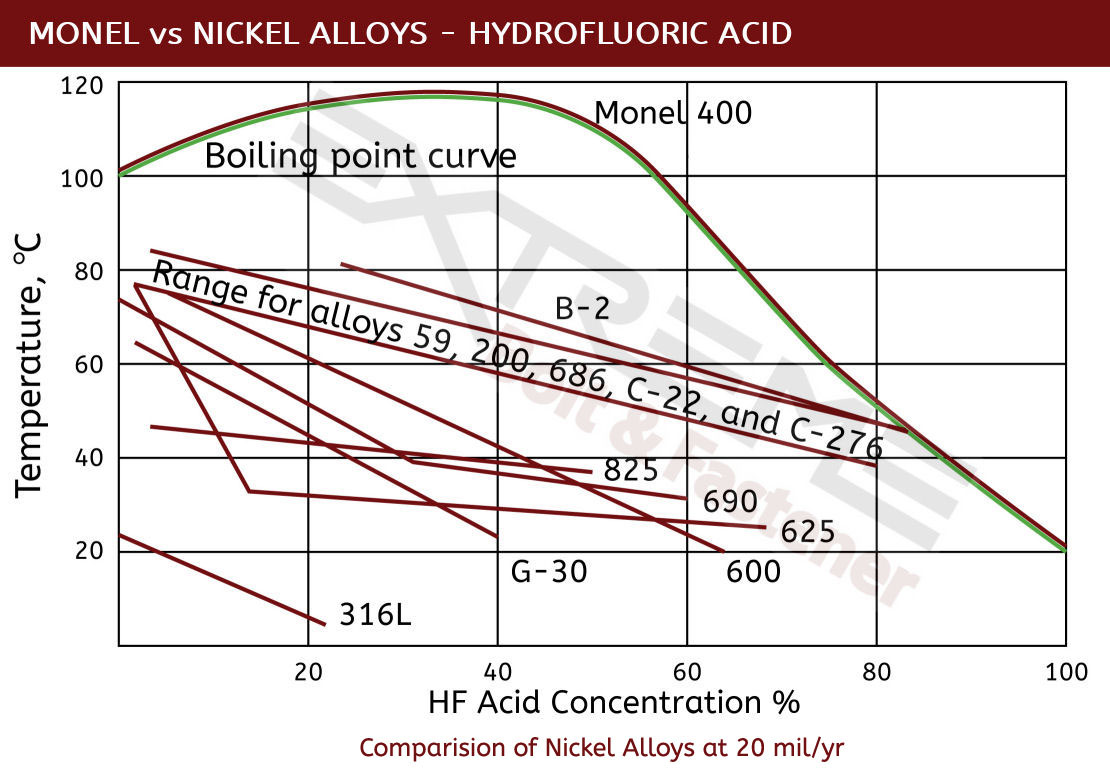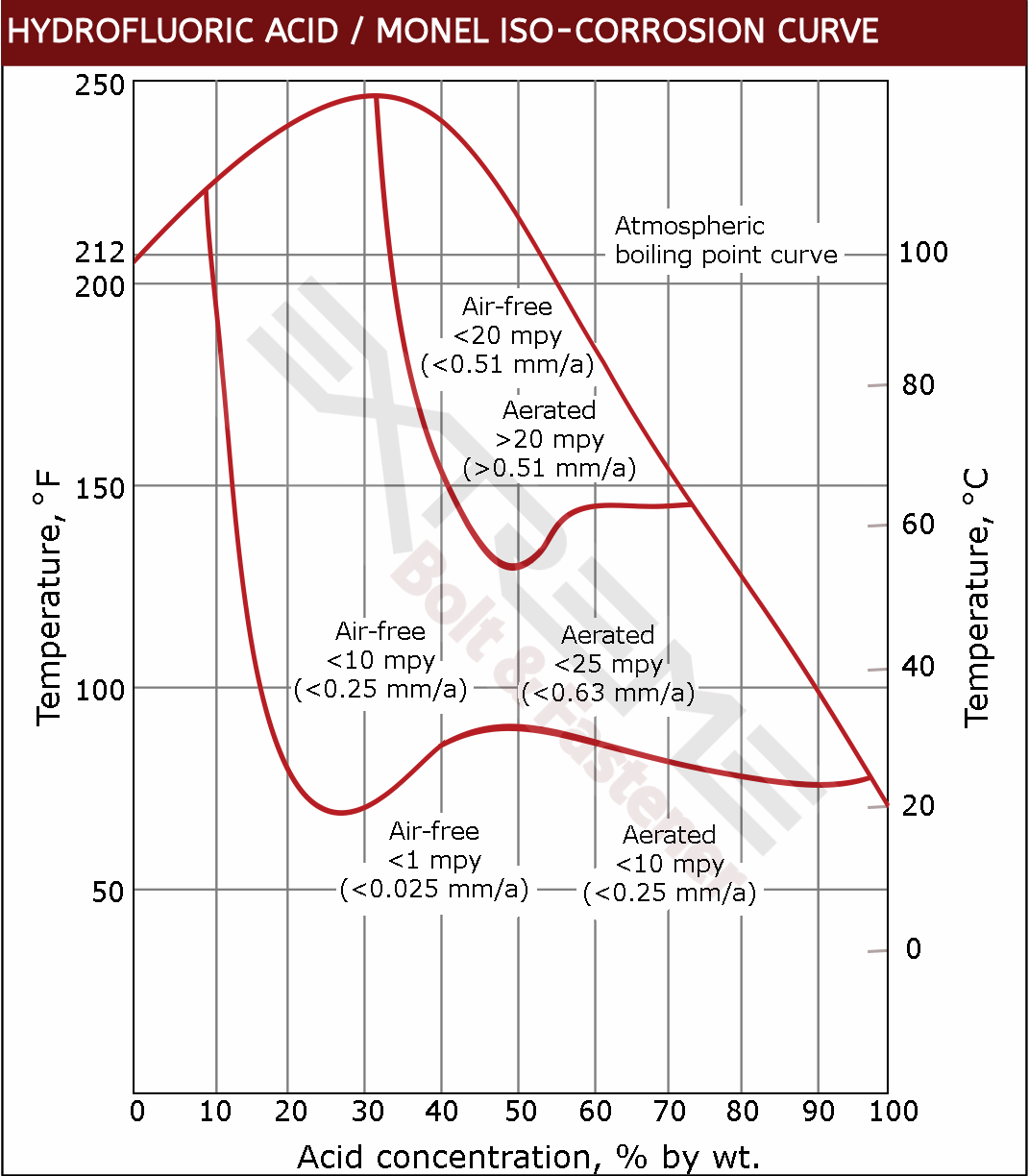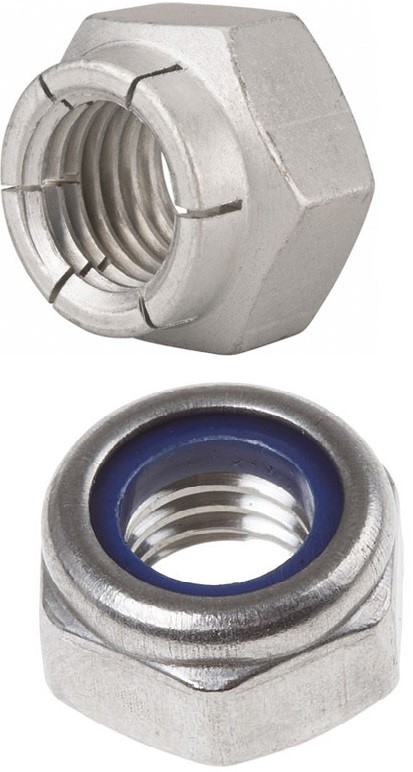A Ni-Cu alloy with high strength and good corrosion resistance
- Excellent resistance to hydrofluoric acid
- Excellent resistance to sea water for marine applications
- High strength metal with good toughness at high temperatures
- In-depth information on grades 400 and K500
- Datasheets available for Monel 400 and Monel K500
- Monel lock nut features and benefits
Monel® lock nuts, like Monel 400 and K500, are made from a nickel-copper alloy and exhibit high strength, toughness and good corrosion resistance over a wide temperature range. An outstanding characteristic of Monel lock nuts is that they offer exceptional resistance to hydrofluoric acid, a particularly tough acid to deal with, in all concentrations up to the boiling point. For hydrofluoric acid applications Monel nuts are perhaps the most resistant of all commonly used specialty alloys.
Monel alloy 400 & K500 lock nuts also exhibit excellent corrosion resistance in marine applications and have reasonable corrosion resistance to sulfuric and hydrochloric acids under reducing conditions.
Because of these characteristics, Monel nuts are often found in marine and chemical processing applications.
The most common grades of Monel nickel alloy nuts are Monel 400 and Monel K500 . Gain more insight on these two grades by accessing our Monel 400 and K500 overviews or by contacting our engineering experts.
Resources: Monel Torque Spec, Flange Dimensions, Flange Bolting Chart, Monel 400, Monel K500
Monel Locknut Features and Beneifts
A Monel locknut resists loosening from vibrations and torque. One of the most common styles is a prevailing torque locknut. This kind of Monel locknut has a prevailing torque feature which deforms elastically, preventing it from freely spinning like a standard nut.
The two most common and reliable forms of prevailing torque locknuts are the flexloc style and the polymer insert lock nut. A Monel flexloc nut is all-metal in composition with a segmented collar that creates six “locking fingers,” that act as a spring. Monel polymer insert lock nuts are often referred to as nylon insert locknuts, although various high performance polymers can be used for the screw threads to “bite into.” Both flexlock and polymer insert locknuts are available in both hexagonal and 12 point configurations.
All Metal Flexloc Lock Nut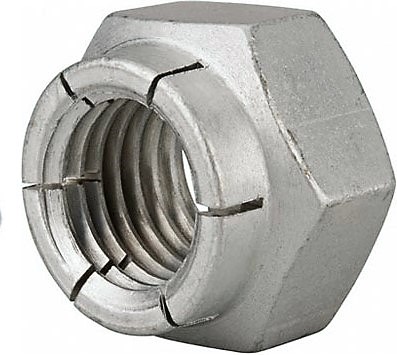 | 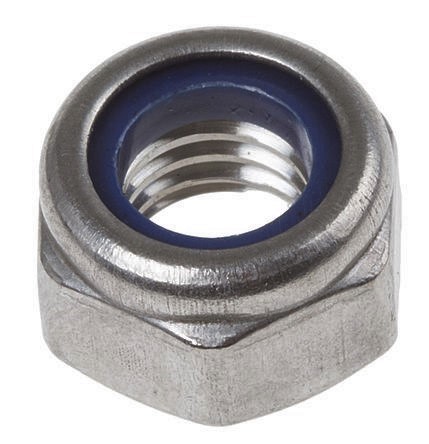 Polymer/Nylon Insert Lock Nut Polymer/Nylon Insert Lock Nut |
|
|
Other all metal lock nuts available include the Monel stover and elliptical styles. Though these styles are often a cheaper initial cost, they are less reliable than the flexloc style. As these styles delivering less prevailing torque cycles and often result in more failures, the flexloc style is a better investment for both reliability and cost savings.
Common Grades of Monel Nuts
Monel 400
Monel 400, UNS N04400 (QQ-N-281), is a nickel-copper alloy with high strength and excellent corrosion resistance in a range of media including sea water, hydrofluoric acid, sulfuric acid, and alkalies. Monel 400 is commonly in marine engineering, chemical and hydrocarbon processing applications.
Monel 400 Specifications: BS3075NA13 (Wire), BS3076NA13 (Bar), ASTM B 164 (Rod, Bar, and Wire), ASTM B 564 (Forgings), ASME SB 164 (Rod, Bar, and Wire), ASME SB 564 (Forgings), AECMA PrEN 2305 (Wire for Rivets), SAE AMS 4675 (Bars and Forgings), SAE AMS 4730 (Wire), SAE AMS 4731 (Wire and Ribbon), DIN 17752 (Rod and Bar), DIN 17753 (Wire), DIN 17754 (Forgings), VdTÜV 263 (Sheet, Plate, Bar, and Tubing), QQ-N-281 (Plate, Sheet, Strip, Bar, Rod, Wire, and Forgings), Werkstoff 2.4360

Monel K500
Monel K500, UNS N05500 (QQ-N-286), is a precipitation-hardenable nickel-copper alloy that combines the corrosion resistance of Monel alloy 400 with greater strength (over 2x as strong) and hardness. It also has low permeability and is nonmagnetic to temperatures as low as -150°F (-101°C).
Monel K500 Specifications: BS3075NA18 (Wire), BS3076NA18 (Rod and Bar), ASTM B 865 (Rod and Bar), DIN 17752 (Rod and Bar), DIN 17753 (Wire), DIN 17754 (Forgings), QQ-N-286 (Rod, Bar, Wire, and Forgings), SAE AMS 4676 (Rod and Bar), ASME Code Case 1192 (Rod and Bar), ISO 9723 (Bar), ISO 9724 (Wire), ISO 9725 (Forgings), Werkstoff 2.4375

Mechanical Properties of Monel
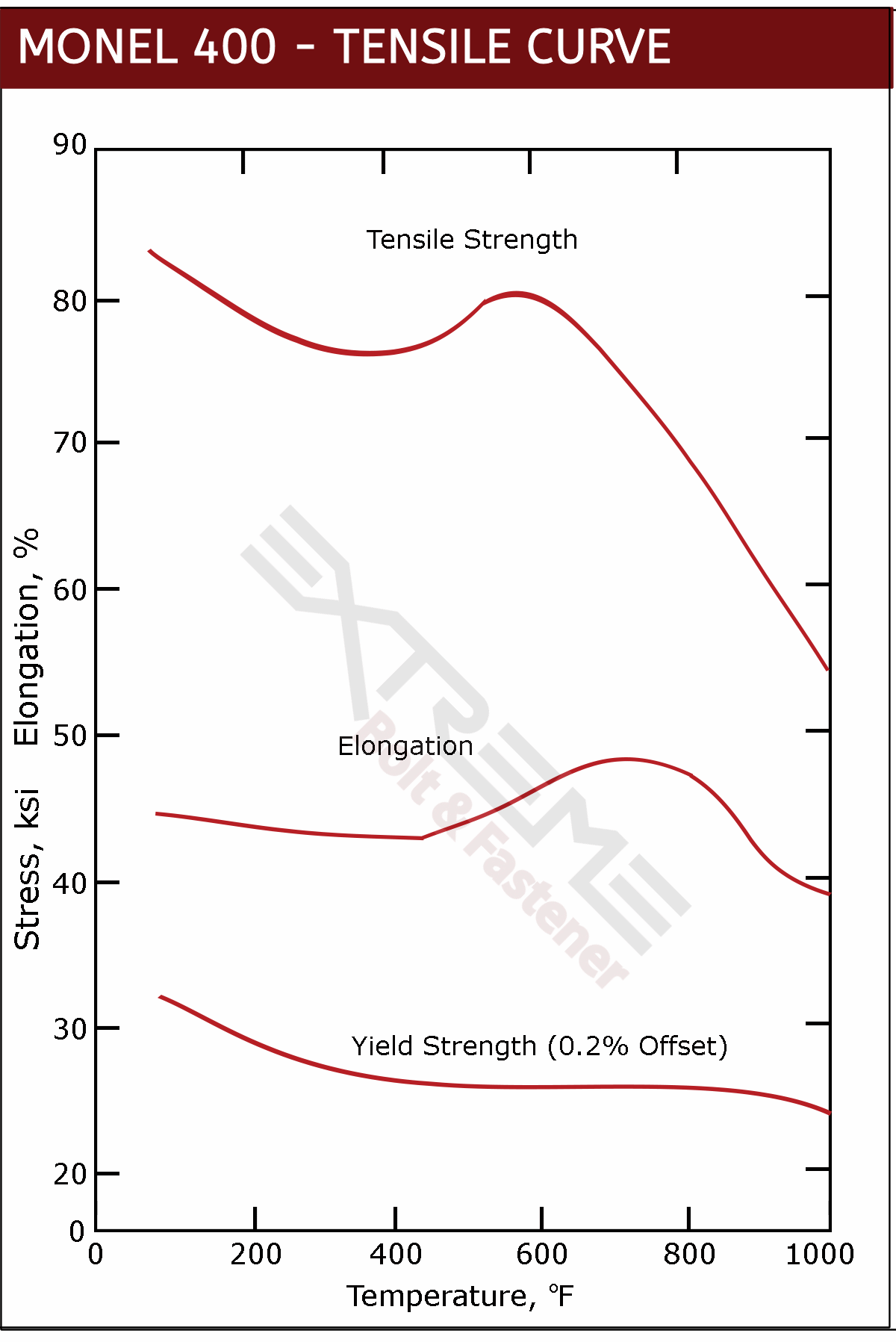
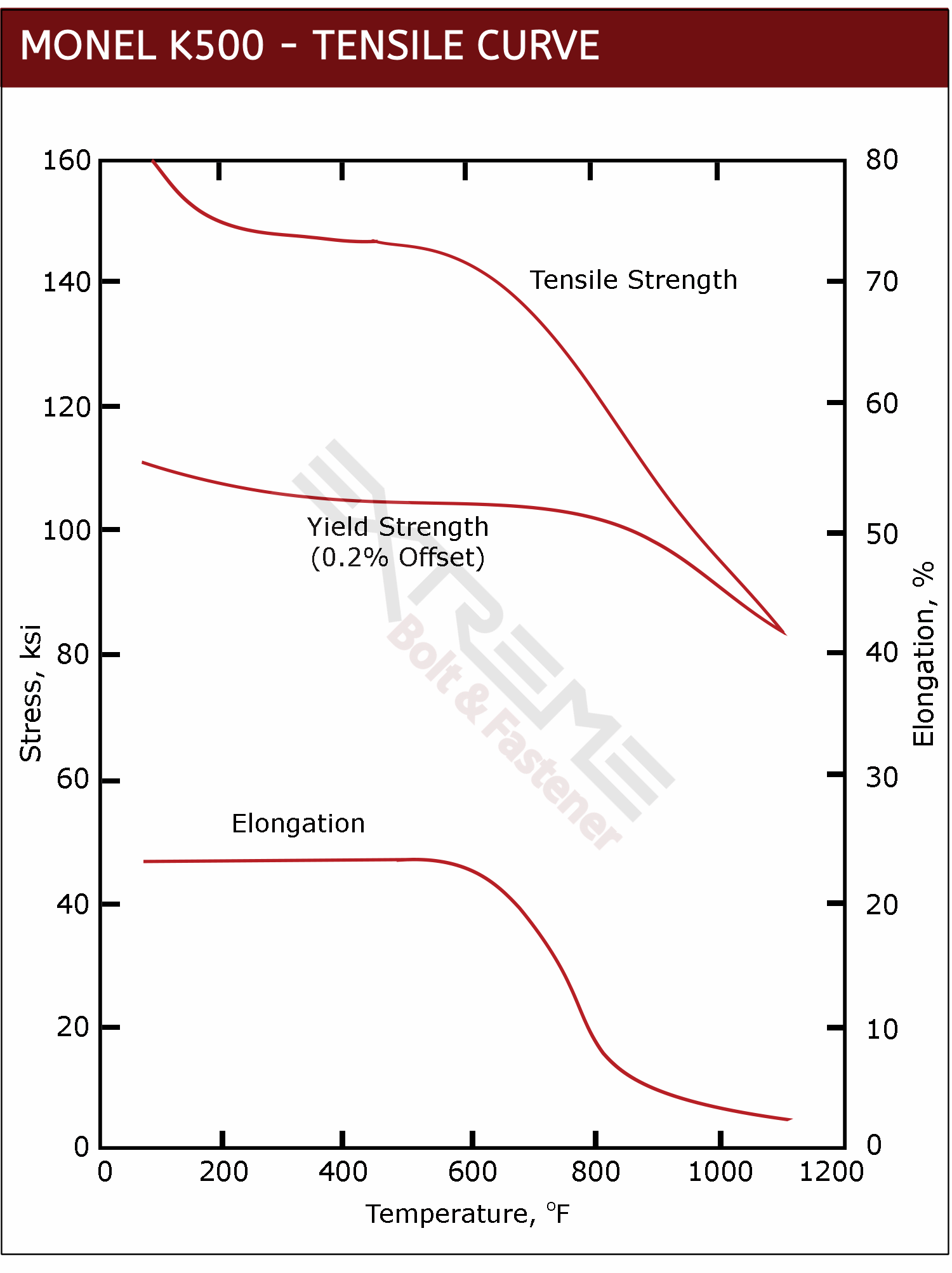
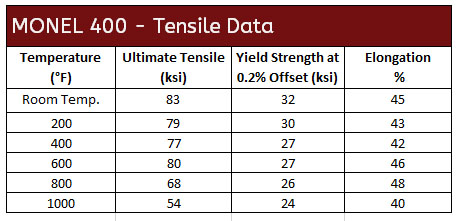
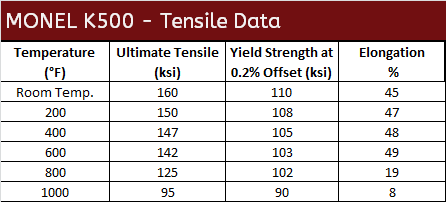
Monel 400 Corrosion Data
